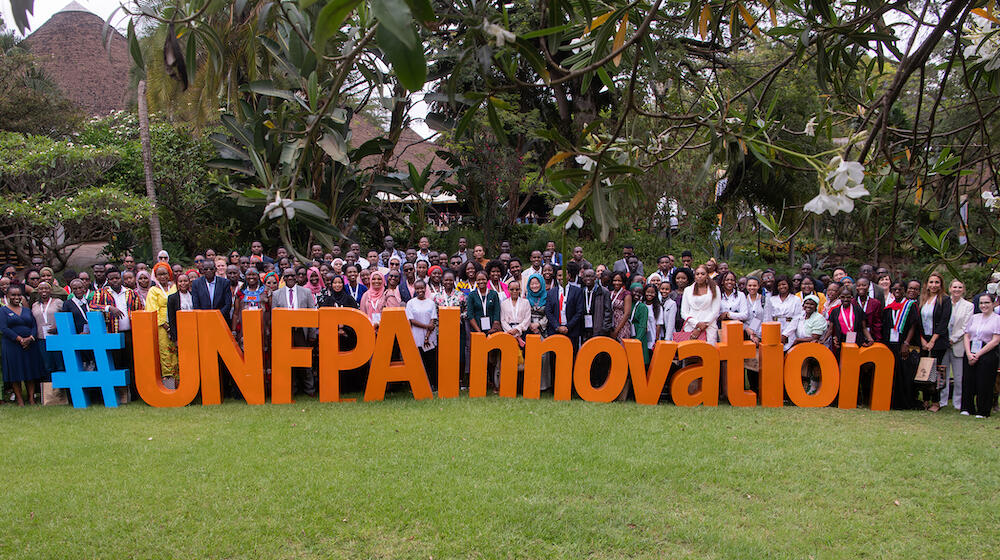
UNFPA Harmful Practices Innovation Summit
PRESS RELEASE
Nairobi, 20 October 2023 – In a powerful gathering of innovative minds, UNFPA, the United Nations sexual and reproductive health agency, in collaboration with the UNFPA-UNICEF Joint Programme on the Elimination of Female Genital Mutilation and the Spotlight Initiative, hosted a three-day summit to address the deeply entrenched social and cultural norms of female genital mutilation (FGM) and child marriage.
The event took place in Nairobi, Kenya, from 18-20 October and brought together 236 participants from 27 countries, including policymakers, young innovators, FGM experts, enterprise coaches, donors, investors, and digital communicators.
With just seven years left to reach the global target of eliminating FGM, only collective and well-funded action and innovative approaches to community awareness can end this harmful practice. To achieve the target of ending FGM by 2030, as set out in the Sustainable Development Goals, evidence-based efforts and innovation must be redoubled.
An estimated 650 million girls were child brides worldwide, including 130 million African girls and women. Globally, almost 200 million girls and women alive today have undergone FGM in 31 countries across three continents, with 80 per cent of cases occurring in Africa. FGM persists as a grave violation of women's and girls' rights, perpetuating gender inequality and causing severe physical and mental harm. If left unchecked, it could impact another 68 million women and girls by 2030. With only seven years left to reach the global target of eliminating FGM, it is clear that collective, well-funded, and innovative action is urgently needed.
The summit, led by youth and women, focused on promoting innovative interventions to combat these harmful practices and equip the next generation with the tools to advocate for the rights of women and girls.
Opening the summit, Ms. Lydia Zigomo, Regional Director for UNFPA East and Southern Africa, emphasized the need for collaboration to ensure women and girls live free from the shadow of FGM and child marriage. She urged participants to embrace innovation as a driving force in the pursuit of a more equitable and just world.
The event provided a platform for young African social innovators to address critical issues related to harmful practices, share ideas and success stories, and enhance their technical and leadership capacities through interactive sessions. These innovators presented their solutions to FGM and child marriage, with robust audience interaction leading to the selection of two innovative projects – AfyaToon, a Tanzania-based start-up using visual arts to help end FGM and health education, and SmartRR, a Nigeria-based mobile app connecting FGM and gender-based violence survivors with support – poised to make a difference.
Key facts about FGM
- The practice of FGM is rooted in gender inequality and power imbalances, limiting opportunities for girls and women in health, education, income and equality.
- Girls are today one-third less likely to be subjected to FGM compared to three decades ago; however, progress needs to be at least 10 times faster to meet the global target of FGM elimination by 2030.
- Approximately $2.75 billion is required to eliminate FGM by 2030 in 31 priority countries, with a resource gap of about $2.1 billion.
- 52 million girls and women underwent FGM at the hands of health-care personnel, indicating a growing medicalization of the practice.
- Girls whose mothers have primary education are 40% less likely to undergo FGM than those whose mothers have no education.
- Early intervention is crucial, as FGM is increasingly performed on the youngest girls.
In their closing statement, the participants pledged to embrace innovation as a catalyst for change, promising to break barriers, empower change, inspire innovation, strengthen capacities, and create networking opportunities. They emphasized the importance of knowledge sharing, collaboration, and mutual support in the ongoing fight against the drivers of harmful practices against women and girls.
NOTE TO EDITORS
UNFPA is committed to supporting the development of an enabling environment to grow innovation in the region and has adopted innovation as an accelerator of UNFPA’s three Transformative Results including ending preventable maternal death, ending unmet need for family planning, and ending gender-based violence and harmful practices.
For more information, or to request interviews, contact:
Daisy Diamante Leoncio, Regional Communication Adviser
leoncio@unfpa.org +1 (347) 491-9154


